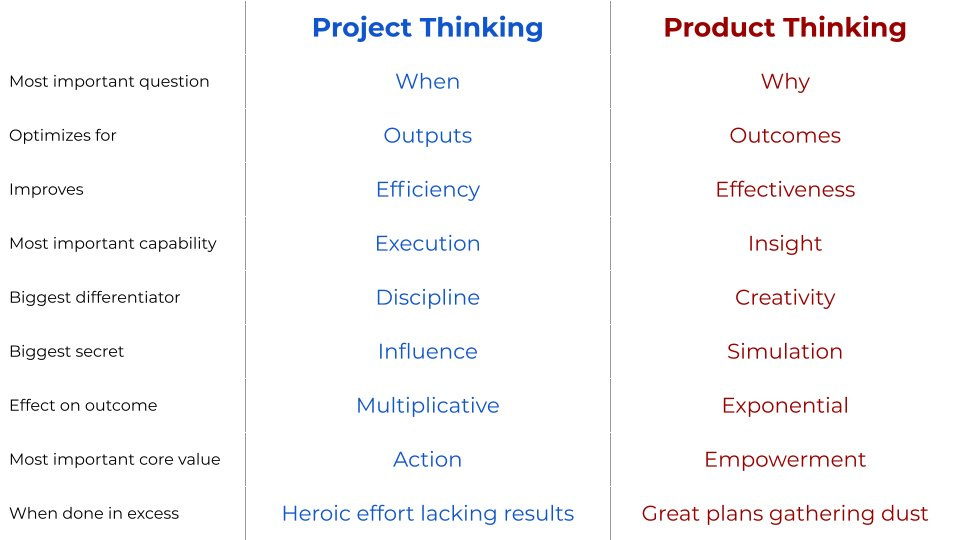Product Management - Notes Basics
Notes from The OG PM - @shreyas about basics of Product management and Product Sense.
Outline:
What is Product Management?
Mindset and Perspective - Project Thinking vs. Product Thinking
Product Sense
What I’ll be reading and consuming in the next 2 to 3 months, to become a better leader and better at Building Products.
What is product management?
The responsibility of a product manager is to get a clear vision of the product lifecycle, analyze it, survey it, research, and most importantly shape and ship the product. A product manager connects business strategy, design knowledge, and customer needs in order to develop a product that is relevant, feasible, and valuable.
In his book Inspired, Marty Cagan describes the job of the product manager as “to discover a product that is valuable, usable and feasible”.
from the image below it is very clear what the role of a Product Manager or Product Management Responsibility is.

Mindset and Perspective - Project Thinking vs. Product Thinking
Project Thinking - Project thinking is about understanding expectations, formulating plans, marshaling resources, and coordinating actions to meet the expectations.
Main Objectives :
When?
Who?
What Else?
How?
When does it need to be done?
Who will do it?
What else is like this?
How we will do it?
Product Thinking - Product thinking is about understanding motivations, what is the purpose of feature X or Y, conceiving solutions, simulating their effects, and picking a path based on the effect you want to create.
Main Objectives:
Why?
What?
What else?
How?
Why is it important?
What are our goals?
What else could happen?
How will we differentiate?
The whole context gets changed while switching from project thinking to product thinking.
“When” and “Who” is at the top of the mind during project thinking.
“Why” and “What” are at the top of the mind during product thinking.
How to break down things as a Product Thinking:
Suspend the Project Thinking Mindset
Prioritize your real goals
Understand your user needs
Generate option
Simulate
Product Sense
What is Product Sense?
It’s the ability to make correct decisions even when faced with considerable ambiguity. Product sense is a blend and combination of various disciplines and concepts and the end result is the ability to make decisions and build products.
Product sense should be developed at multiple levels:
What are we building and Why are we building a very clear vision.
How the user will interact with the end product
UI/UX Interfaces
Purpose and motivation behind every feature and functions
Defining and communicating a clean and clear product flow
User stories
Creativity
Surveys and market research
Psychology and Human-Computer Interactions principles
And everything in between that from start to end journey of a product
The three key elements of “Product Sense”:
Empathy - this is how the user is likely to react
This is the ability to simulate the mental processes of multiple different types of personas that are nothing like you. Simulate in your mind as a third person and say what if “I am the user, and what will be my first reaction seeing the user interface or any feature”, how to explain the reaction and emotion to others while just simulating the product in the brain. To be able to really do that well is one key element of product sense.
To improve the empathy of most of the PMs they do is, talk to different types of users, or talk to the target audiences, to get feedback. As you do this, don't just talk to them and take the information they're giving you. Try to evaluate why they are saying what they're saying because that is the more important aspect of building this empathy. Most of the time you are not going to have users in front of you, you have to reliably predict it by understanding why they feel or react in a certain way.
Learn more about psychology, things like cognitive biases, including behavioral economics, these are the tools that make your simulations processing very efficient and stronger.
Domain Knowledge - Customer, competition, technology.
Focus on knowledge about your customers and your users, the competition and what they are doing, and technology limitations or opportunities.
Creativity - Creative and novel solutions to complex and hard usability problems. Creativity comes from within, inspiration and practice. Yes, Practice plays important role in creativity. Creativity is always in mind and its way of seeing the world and your perspective about certain things, when it is practiced and put on canvas or paper, creativity is completed. Some of the greatest product designers are not creative in designing a design, but they are creative in mind, see the products differently, and has seen thousands of products and design, without creating any design on Figma or paper they convey their creativity just by communicating that other’s don’t see or other don’t able to think about it.
The Three Essential senses that PM should possess:
Execution Sense: The ability to align people towards an objective and orchestrate complex projects.
Analytical Sense: The ability to frame the right question, evaluate a problem from multiple facets, simulate outcomes, and be able to use data to predict and calculate well.
Product Sense: The ability to usually make correct product decisions even when there is significant ambiguity.
Resources that I’ll be consuming to increase the depth of the Product Management and Leadership domain.
Books:
Getting Things Done
Hooked
Art of Thinking Clearly
Brain and Brand
(PS: There are tons of other books on a different domain that merges into Product Management, for right now I have planned to read the above books, will post the books list on the next series of learning PM)
Articles :
https://a16z.com/2012/06/15/good-product-managerbad-product-manager/
https://blackboxofpm.com/mvpm-minimum-viable-product-manager-e1aeb8dd421
https://www.sachinrekhi.com/top-10-deliverables-of-product-managers
https://medium.com/@hemal/the-modern-day-good-product-manager-bad-product-d5b537398e3a
https://gopractice.io/blog/
https://itamargilad.com/blog/
https://github.com/yuhenobi/awesome-product-manager
Must Read Twitter Threads :
 What do Great Product Managers Have That Other Product Managers Sometimes Lack? I read 100+ articles and threads to understand 1. The role of a product manager 2. What it means to be a GREAT product manager And then I summarised my learnings in this thread 🧵
What do Great Product Managers Have That Other Product Managers Sometimes Lack? I read 100+ articles and threads to understand 1. The role of a product manager 2. What it means to be a GREAT product manager And then I summarised my learnings in this thread 🧵











